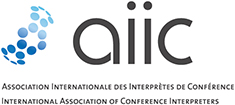AIIC members have long recognised the importance of investing in independent research into issues of concern to conference interpreters.
We do this in a number of ways:
- By funding the AIIC research grant
- By participating in research studies conducted by recognised bodies
- By commissioning specific studies into technical and health issues related to interpretation through our specialised committees
- By conducting surveys of our members
AIIC Technical Reports
AIIC's former Technical and Health Committee (THC) commissioned and (co-)financed several studies by research institutes and universities.
Measurement of acoustic parameters in teleconferencing systems, April 2022
In October 2021, the Technical and Health Committee commissioned and financed a number of tests from Professor Angelo Farina of the Advanced Industrial Design in Acoustics S.r.l. at the University of Parma, with a view to ascertaining whether the specific ISO values of 125 – 15,000 Hz frequency response required within the existing standards pertaining to conference interpreting systems could be met with a flat, linear frequency response by cloud-based services such as videoconferencing or so-called RSI (Remote Simultaneous Interpreting) platforms. This requirement is a prerequisite for broadcast-quality sound.The platforms tested were:
- Cleanfeed, a browser-based, audio-only platform used by radio stations and recording studios
- Zoom, including Zoom in High-Fidelity Music Mode, with Original Sound activated and all other forms of live processing deactivated
- Interactio, a browser-based RSI platform offering a variety of bitrates and the possibility to deactivate specific forms of audio processing such as noise/echo suppression and automatic gain control
Evaluation of Simultaneous Interpreting Delivery Platforms for ISO Compliance, January 2021
In November 2020, the Technical and Health Committee commissioned a second round of testing of Remote Simultaneous Interpreting Platforms, to be carried out by AiR INGENIEURBÜRO GMBH.
The Technical Tests on the Sound Quality of Simultaneous Interpreting Delivery Platforms (SIDPs) were run using the same basic methodology and techniques as the first test in early 2020, whilst the complexity of the transmission paths was reduced to obtain more precise results.
The following platforms were tested: Ablioconference, Interactio, Interprefy, Kudo, Quaqua, VoiceBoxer, Webswitcher, Zoom “advanced mode”, Zoom “standard mode”.
The full reports are available to AIIC members in the members' portal.
The AIIC Research Grant
The AIIC Research Grant was launched in 2020.
The grant awards CHF10,000 to support academic research that benefits the conference interpreting profession.
Applications for the 2024 Research Grant will open in July 2024.
Previous Winners
2021
Professor Heidi Salaets (University of Leuven)
Professor Geert Brône (University of Leuven)
PROJECT:
Working at a distance from everybody: impact of cognitive load and wellbeing of interpreters working with Video-based Interpreting Platforms (VIPs).
OVERVIEW:
The project explores the social and cognitive impact of working with state-of-the-art interpreting technology during remote simultaneous interpreting, from the perspective of professional interpreters.
The project involves 2 pilot studies to consider cognitive load and ergonomics in RSI. The first one investigates how the use of VIPs enhances the wellbeing of interpreters during remote, individual and solitary work; the second uses eye-tracking technology to examine how working in a ‘home booth’ with multiple screens impacts cognitive load.
Professors Salaets and Brône presented their project and initial findings to members in Brussels in June 2023.
2020
Dr Nicoletta Spinolo (University of Bologna at Forlì)
Professor Agnieszka Chmiel (A. Mickiewicz University, Poznan)
PROJECT:
Inside the virtual booth: the impact of remote interpreting settings on interpreter experience and performance.
OVERVIEW:
By collecting process, product, and subjective data through eye-tracking recordings, performance evaluations, and questionnaires, the project investigated how remote interpreting settings (hubs with boothmate or home studio) and types of input (audio, video, slides etc.) influence user experience, interpreter stress levels, fatigue, mental workload and performance. The recommendations to the profession and the AIIC community are intended to help interpreters negotiate and implement optimal working conditions in the virtual booth.


